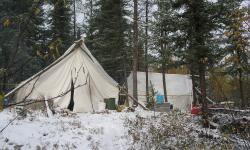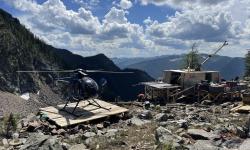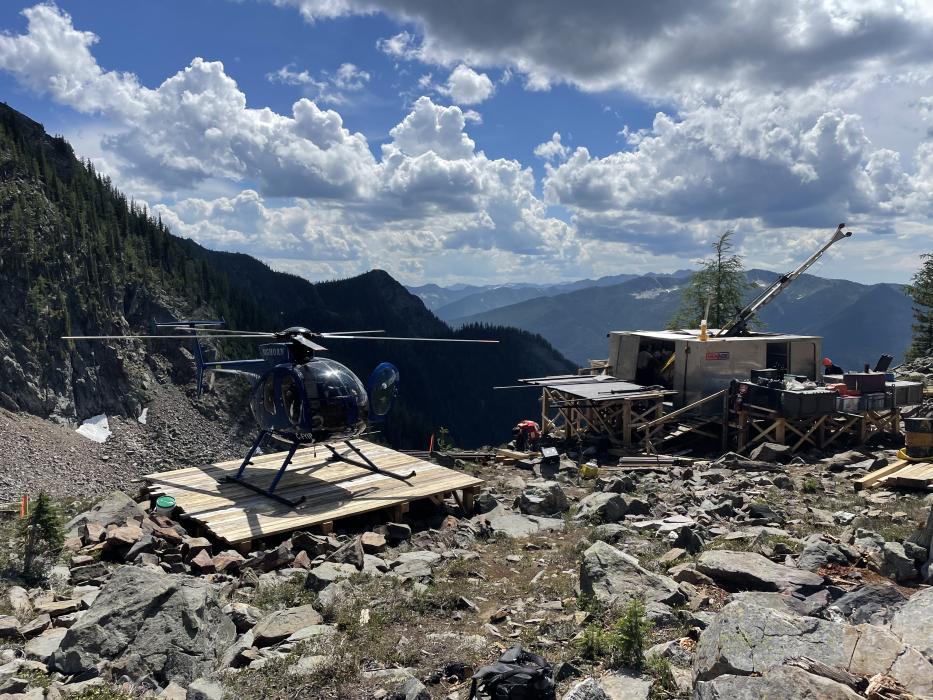
Eagle Plains Reviews 2023 Drilling Results at Vulcan, Engages Sinn for Communications and Marketing
British Columbia | January 18, 2024Cranbrook, B.C., January 18th, 2024: Eagle Plains Resources Ltd. (TSX-V:EPL) (“EPL” or “Eagle Plains”) reports that final analytical results have been received from its Summer, 2023, seven-hole, 4253m (13,953’) drill program on Eagle Plains’ 100% owned Vulcan Project located 30km west of the world-class Sullivan deposit in Kimberley, BC. The Vulcan Property is accessible by an extensive network of well-maintained forest service roads. All holes completed during the 2023 program successfully intersected alteration and mineralization interpreted to represent stratabound Sedimentary Exhalative (“Sedex”) style zinc-lead-silver. Drilling was successful in further defining sub-basin architecture and expanded the known area of bedded mineralization hosted in the Lower Aldridge Formation, first intersected in 2022 (DDH VU22004). Mineralized clasts within a fragmental unit have been defined over a strike length of approximately 700m and approximately 250m down-dip (west). In addition to the reported mineralization, significant tourmaline alteration of sediments, coupled with an increase in fragmental thicknesses suggests close proximity to basin-controlling faults and a mineralized feeder zone. Downhole electromagnetic surveying (BHEM) was carried out at the completion of drilling activity, though due to caving hole conditions only select holes could be adequately surveyed. Results and interpretation for this survey are pending.
View Vulcan Project Drillhole Plan here
2023 Drilling Highlights/Observations:
- All holes drilled in 2023 intersected mineralized clasts within a broad fragmental package. Mineralized fragmental has been defined over a strike length of ~700 m and ~250 m down-dip;
- Bedded mineralization in lower-Aldridge sediments (newly defined “Vulcan Horizon”) appears to be best defined in southern drill holes (VU22004, VU23001, VU23002);
- Intense tourmaline alteration associated with semi massive pyrrhotite-pyrite±chalcopyrite±arsenopyrite increases in intensity and thickness to the south.
2023 Drill-hole Summaries:
- DDH VU22004 (extension)
- Drillhole extended to test for additional mineralization intersected in VU22004
- DDH VU23001
- further defined lower Aldridge “Vulcan Horizon” mineralization first intersected in 2022 (DDH VU22004);
- intersected a 38.0m interval of intensely tourmaline altered sediments associated with chaotic quartz veining and semi-massive disseminated and next-textured pyrrhotite-pyrite±chalcopyrite±arsenopyrite;
- DDH VU23002
- mineralized clasts start at the fragmental / wacke contact;
- DDH VU23003
- 362.7m thick fragmental package (321.0-683.7m) indicating thickening of the unit to the west;
- DDH VU23004
- hole shut down in a >643.00m wide fragmental displaying textures consistent with a discordant clastic dyke, similar to footwall feeder zones observed beneath the Sullivan Deposit;
- DDH VU23006
- Collared 475m northwest of VU22004, VU23001-004
- mineralized fragmental clasts up to 39 cm in length.
2023 Drill Collar Locations:
| Hole ID | Easting* | Northing* | Elev (m) | Final Depth (m) | Az (°) | Dip (°) | Status |
|---|---|---|---|---|---|---|---|
| VU22004 (extension) | 547009 | 5516172 | 2258 | 829.0** | 106.0 | -45.0 | Complete |
| VU23001 | 547009 | 5516172 | 2258 | 765.6 | 130.0 | -45.0 | Complete |
| VU23002 | 547009 | 5516172 | 2258 | 715.6 | 78.0 | -45.0 | Complete |
| VU23003 | 547009 | 5516172 | 2258 | 824.8 | 78.0 | -70.0 | Complete |
| VU23004 | 547009 | 5516172 | 2258 | 931.8 | 106.0 | -80.0 | Complete |
| VU23005 | 546864 | 5516625 | 1997 | 39.6 | 103.0 | -55.0 | Abandoned |
| VU23006 | 546864 | 5516625 | 1997 | 744.0 | 90.0 | -55.0 | Complete |
*All coordinates are projected in NAD83 UTM Zone 11N
** In 2023 DDH VU22004 was extended from 597.0-829.0m (232.0m)
Significant Drill Results:
| Hole ID | From (m) | To (m) | Core Interval (m)*** | Ag (g/t) | Zn (%) | Pb (%) | Zn+Pb (%) | Cd (ppm) | Sn (ppm) |
|---|---|---|---|---|---|---|---|---|---|
| VU22004 (extension) |
No significant results | ||||||||
| VU23001 | 501.65 | 530.50 | 28.85 | 0.92 | 0.17 | 0.10 | 0.27 | 7.28 | 150.61 |
| including | 505.60 | 506.60 | 1.00 | 4.35 | 0.47 | 0.66 | 1.13 | 21.91 | 111.20 |
| and | 530.50 | 548.00 | 17.50 | 0.68 | 0.20 | 0.06 | 0.26 | 13.24 | 130.63 |
| including | 532.00 | 533.50 | 1.50 | 1.43 | 0.21 | 0.35 | 0.56 | 14.65 | 106.00 |
| and | 569.00 | 574.00 | 5.00 | 5.36 | 0.23 | 0.18 | 0.41 | 25.94 | 139.28 |
| VU23002 | 327.50 | 347.00 | 19.50 | 1.17 | 0.17 | 0.15 | 0.32 | 4.59 | 27.11 |
| and | 512.62 | 526.40 | 13.78 | 1.51 | 0.21 | 0.12 | 0.34 | 10.08 | 54.18 |
| including | 523.24 | 523.77 | 0.53 | 9.21 | 0.79 | 0.94 | 1.73 | 35.17 | 26.41 |
| and | 604.05 | 609.68 | 5.63 | 0.89 | 0.21 | 0.09 | 0.30 | 8.23 | 60.49 |
| VU23003 | 526.50 | 543.25 | 16.75 | 0.87 | 0.20 | 0.12 | 0.32 | 6.08 | 28.00 |
| and | 578.70 | 605.70 | 27.00 | 1.43 | 0.13 | 0.12 | 0.25 | 4.77 | 27.59 |
| including | 578.70 | 580.34 | 1.64 | 5.74 | 0.45 | 0.52 | 0.97 | 18.86 | 38.21 |
| including | 579.59 | 580.34 | 0.75 | 4.67 | 0.87 | 0.63 | 1.50 | 34.6 | 27.5 |
| including | 602.90 | 604.20 | 1.30 | 3.64 | 0.39 | 0.51 | 0.91 | 13.18 | 30.14 |
| including | 603.30 | 603.60 | 0.30 | 13.35 | 1.17 | 1.92 | 3.09 | 40.30 | 24.40 |
| and | 661.80 | 683.70 | 21.90 | 0.91 | 0.07 | 0.08 | 0.15 | 2.13 | 108.09 |
| and | 691.80 | 703.25 | 11.45 | 0.60 | 0.14 | 0.02 | 0.16 | 6.74 | 125.34 |
| VU23004 | 715.00 | 731.50 | 16.50 | 0.36 | 0.11 | 0.02 | 0.13 | 4.82 | 16.43 |
| VU23005 | hole abandoned; no significant results | ||||||||
| VU23006 | 492.15 | 493.55 | 1.40 | 2.62 | 0.75 | 0.27 | 1.02 | 33.34 | 12.15 |
*** all intercepts are believed to approximate true widths
Drill-hole VU23001 intersected cm-scale stratabound (laminated) and fragmental (clast) zinc, lead and silver mineralization 130m SE along strike from mineralized horizons observed in DDH VU22004. Mineralized clast textures indicate reworking and redeposition of primary bedded sulphides. Mineralized intercepts near the base of the fragmental include 28.85m (501.65-530.5m) of 0.17% Zn and 0.10% Pb (0.27% Zn+Pb) including 1.00m of 0.47% Zn and 0.66% Pb (1.13% Zn+Pb). Mineralization continues immediately underlying the fragmental, hosted in thin bedded wackes of the Lower Aldridge Formation and is interpreted to represent the Vulcan Horizon. Assays returned 17.50m (530.50-548.00m) of 0.20% Zn and 0.06% Pb (0.26% Zn+Pb). Laminated mineralization continues as discrete horizons in the Lower Aldridge sediments, returning 5.00m (569.00-574.00m) of 0.23% Zn and 0.18% Pb (0.41% Zn+Pb).
Drill-hole VU23002 extended mineralization along strike approximately 130 m NW of VU22004 and 300 m NW of VU23001. The hole intersected significant fragmental (clast) mineralization (pyrrhotite±sphalerite±galena) starting at the top of the thick fragmental unit, a trend not seen in previous holes. Thin beds (up to 5cm thickness) of undisturbed sediments with significant disseminated sphalerite (zinc) and galena (lead) occur at the base of the fragmental and correlate with mineralization in VU22004 and VU23001. Assay results from the fragmental package returned 19.50m (327.50-347.00m) of 0.17% Zn and 0.15% Pb (0.32% Zn+Pb). Zinc and lead mineralization in the Lower Aldridge sediments underlying the fragmental (Vulcan Horizon) form disseminations in distinct cm-scale beds up to 0.53m wide. Significant assay results within the Vulcan horizon include 5.63m of 0.21% Zn and 0.09% Pb (0.30% combined Pb+Zn) starting at 609.68m.
Drill-hole VU23003 intersected a significantly thicker interval of fragmental, up to 362.70m (321.00-683.70), than seen in previous up-dip holes. Geological interpretation suggests that the rapid thickening of fragmental down-dip indicates that the axis of the structure controlling sub-basin/graben development is oriented north-south. Similar to other holes, fragmental clasts show compositional zoning down section, becoming increasingly sulphide-rich downhole, below 467.0m. Within the fragmental are sphalerite (Zn) and galena (Pb) mineralized beds up to 4 cm wide, interpreted to be in-situ. Mineralization within the fragmental forms three distinct horizons: The upper horizon returned 16.75m (526.50-543.25m) of 0.20% Zn and 0.12% Pb (0.32% Zn+Pb). The middle horizon returned 27.00m (578.70-605.70m) of 0.13% Zn and 0.12% Pb (0.25% Zn+Pb). The lowermost horizon 21.90m (661.80-683.70m) returned 0.07% Zn and 0.08% Pb (0.15% Zn+Pb). The Vulcan horizon is less developed, returning 11.45m (691.80-703.25m) of 0.14% Zn and 0.02% Pb (0.15% Pb+Zn).
Drill-hole VU23004 was an undercut to VU22004. A broad fragmental package was intersected between 288.8-931.8m (end of hole), significantly thicker than intersections of the same horizon in previous holes. Similar to other holes the fragmental clasts show compositional zonation. Assays returned 16.50m (715.00-731.50m) of 0.11% Zn and 0.02% Pb (0.13% Zn+Pb). The presence of the significantly thicker fragmental may indicate that the hole was drilling down a discordant clastic dyke, similar to footwall feeder zones observed beneath the Sullivan Deposit.
Drill-hole VU23006 extended the mineralized fragmental trend approximately 400m along strike from VU23002. Mineralization of fragmental clasts increases in abundance downhole between 404.1-630.1m, reaching a maximum mineralized clast size width of 39 cm, with an average width of 2-4 cm. Assay results within the mineralized fragmental package returned 1.40m (492.15-493.55m) of 0.75% Zn and 0.27% Pb (1.02% Zn+Pb). No significant mineralization was intersected within the thin bedded sediments of the Lower Aldridge formation (Vulcan Horizon).
C.C. (Chuck) Downie, P.Geo, President and CEO of Eagle Plains commented recently on the Vulcan program: “The results from the 2023 drill program continue to support the potential for a Sedex deposit at Vulcan. Widespread low-grade stratabound mineralization associated with tourmaline alteration and thick mineralized fragmental units is commonly associated with the ‘Sullivan Corridor’. Although the analytical data returned relatively modest results, we believe that the Vulcan is underlain by a mineralized vent system, and we will continue to work toward finding the source of the mineralization”
Given the recognition of persistent mineralization at depths well below the Lower/Middle Aldridge contact (“LMC”- the interpreted Sullivan time horizon), management intends to review all available historical drill core relating to the Vulcan property, as most historical holes were stopped stratigraphically above the mineralized intervals intersected in Hole VU22004 and all 2023 holes. Future exploration at the Vulcan project will be guided by this re-interpretation of the geology. A 5-year area based permit application has been filed to facilitate ongoing exploration of the property.
Quality Assurance and Quality Control
All drill core samples were analyzed at ALS Canada Ltd. in North Vancouver, BC. The sampling program was undertaken by TerraLogic Exploration personnel under the direction of Kerry Bates, P.Geo. QA/QC protocols are maintained through the insertion of certified reference material (standards), blanks and coarse reject duplicates within the sample stream. Drill core is cut in-half with a diamond saw with one-half placed in sealed bags and shipped to the laboratory and the other half retained in permanent core store in Cranbrook, BC. A secure chain of custody is maintained in transporting and storing of all samples.
The entire sample is crushed to 70% passing 2mm (10 mesh), of which a 500g split is pulverized to 80% passing 75 micron (200 mesh). Multi-element analyses were determined by 4-acid digestion followed by Inductively Coupled Plasma Mass Spectrometry (ICP-MS), reporting 48 elements. Samples with >9,500 ppm Zn or Pb were further analyzed with Inductively Coupled Plasma – Atomic Emission Spectroscopy (ICP-AES). Au is determined by fire assay on a 30g split utilizing Atomic Absorption Spectroscopy (AAS).
Vulcan Project Summary
View Vulcan Project Highlight Map and Drill Core Photos here
View Vulcan Drill Hole VU22004 Interpretation Video here
Management of Eagle Plains considers the Vulcan project to hold excellent potential for the presence of Sedex mineralization. Rocks underlying Vulcan are within the same sedimentary sequence and host occurrences with mineralization and alteration styles similar to those observed at and adjacent to the now-depleted Sullivan deposit. The Main (Hilo) mineral occurrence at Vulcan returned up to 1.6 % combined lead-zinc over 1.5 metres from rocks near the Lower-Middle Aldridge contact (“LMC”), the same time-stratigraphic horizon which hosts the Sullivan deposit.
The Sullivan mine was discovered in 1892 and is one of the largest Sedex deposits in the world. Over its 100+ year lifetime, Sullivan contained a total of 160 million tonnes of ore averaging 6.5% lead, 5.6% zinc and 67 g/t silver, resulting in 298 million ounces of silver, 18.5 billion pounds of lead, 17.5 billion pounds of zinc, and significant quantities of associated metals; collectively worth over $40B at current metal prices. Eagle Plains management cautions that past results or discoveries on proximate land are not necessarily indicative of the results that may be achieved on the Vulcan property.
Vulcan Project History
Sullivan-style mineralization was first reported in the mid-1950s at Vulcan. During the 1970s and 1980s, Texas Gulf Sulphur and later Cominco completed extensive geophysical work and drilled shallow holes to test for continuous mineralization in areas of the property. Drill-testing occurred in the Hilo area during the early 1990s by Ascot Resources. In 1991 a five-hole, 1003m drill program was completed, with three holes totaling 1535m completed in 1992.
Since acquiring the initial claims on the property in 2002, Eagle Plains has completed an extensive compilation of all existing data, followed in 2006 by a 125 line-km helicopter-borne time-domain geophysical survey flown at 200m spacing. Additional claims were added to the property position as they became available through staking. Systematic geochemical, geological and geophysical programs were conducted by Eagle Plains and its partners from 2011-2019.
In June 2020, Eagle Plains completed a two-hole, 977m drill program to test the LMC along an existing road cut in an area of elevated soil geochemistry and anomalous geophysical features (magnetometer, induced polarization and magnetotellurics). The LMC contact was successfully intercepted in Hole VU20002 with significant alteration suggesting proximity to a hydrothermal source, though no economic mineralization was encountered.
In fall 2022 Eagle Plains completed a 3 hole 1,700m diamond drill program at the property. The program successfully defined the LMC 1.8 km south of historic drilling in the Vulcan Zone. Drilling at the West Basin (VU22004) intersected significant mineralization within a broad fragmental (clasts and intact cm-scale beds) and stratabound mineralization within Lower Aldridge sediments. These intercepts represent mineralized horizons deeper in the stratigraphic package than recognized by previous operators and represent a newly defined drill target named the “Vulcan Horizon”.
Eagle Plains’ Findlay project, located directly north of the Vulcan, shares the same prospective geology and is currently under option to Amaroq Gold Corp., a private BC corporation.
2023 Vulcan Program Logistical Summary
The 2023 Vulcan program was carried out by TerraLogic Exploration Services of Cranbrook, BC under the supervision of Kerry Bates, P.Geo. Drilling services were contracted to New Age Drilling Solutions of Whitehorse YK. SJ Geophysics of Delta, BC was retained to carry out down-hole electromagnetic surveying. Bighorn Helicopters of Cranbrook, BC provided helicopter support.
Qualified Persons
Charles C. Downie, P.Geo., a “qualified person” for the purposes of National Instrument 43-101 - Standards of Disclosure for Mineral Projects and a director of Eagle Plains, has reviewed and approved the scientific and technical disclosure in this news release.
Communications and Marketing Contract Information
The Company has retained the services of Robert Sinn (“Sinn”) as an investor relations consultant to provide communication and marketing services including the redistribution of corporate news releases via social media, production of a corporate video and the production of three featured articles. Sinn will be paid US$10,000 for a 12 month period, effective January 1, 2024. Sinn is an arms-length, independent contractor. Sinn has a background in capital markets as a trader, portfolio manager and analyst. He is an investor and market analyst focused on the precious metals and junior mining sectors. Over the past decade he has developed an audience that appreciates his writing, technical analysis charts and market commentary. Sinn currently owns 18,000 shares and 50,000 warrants of Eagle Plains. No stock options were granted to Sinn in relation to this engagement.
About Eagle Plains Resources
Based in Cranbrook, B.C., Eagle Plains is a well-funded, prolific project generator that continues to conduct research, acquire and explore mineral projects throughout western Canada, with a focus on critical metals integral to an increasingly electrified, decarbonized economy. Eagle Plains currently holds over $7.5M in cash and over $1.8M in third-party securities and is well positioned to take advantage of opportunities afforded by today’s challenging financial markets.
The Company was formed in 1992 and is the ninth-oldest listed issuer on the TSX-V (and one of only three that has not seen a roll-back or restructuring of its shares). Eagle Plains has continued to deliver shareholder value over the years and through numerous spin outs has transferred over $100,000,000 in value directly to its shareholders, with Copper Canyon Resources and Taiga Gold Corp. being notable examples. Eagle Plains’ latest spinout, Eagle Royalties Ltd. (CSE:”ER”) was listed in May, 2023 and holds a diverse portfolio of royalty assets throughout western Canada.
Eagle Plains’ core business is acquiring grassroots critical- and precious-metal exploration properties. The Company is committed to steadily enhancing shareholder value by advancing our diverse portfolio of projects toward discovery through collaborative partnerships and development of a highly experienced technical team.
Expenditures from 2010-2023 on Eagle Plains-related projects exceed $38M, the majority of which was funded by third-party partners. This exploration work resulted in approximately 50,000m of diamond-drilling and extensive ground-based exploration work facilitating the advancement of numerous projects at various stages of development.
Throughout the exploration process, our mission is to help maintain prosperous communities by exploring for and discovering resource opportunities while building lasting relationships through honest and respectful business practices.
On behalf of the Board of Directors
“C.C. (Chuck) Downie” P.Geo
President and CEO
For further information on EPL, please contact Mike Labach at 1 866 HUNT ORE (486 8673)
Email: mgl@eagleplains.com or visit our website at https://www.eagleplains.com
Cautionary Note Regarding Forward-Looking Statements
Neither the TSX Venture Exchange nor its Regulation Services Provider (as that term is defined in the policies of the TSX Venture Exchange) accepts responsibility for the adequacy or accuracy of this release. This news release may contain forward-looking statements including but not limited to comments regarding the timing and content of upcoming work programs, geological interpretations, receipt of property titles, potential mineral recovery processes, etc. Forward-looking statements address future events and conditions and therefore, involve inherent risks and uncertainties. Actual results may differ materially from those currently anticipated in such statements.
Related Projects
Latest News Releases
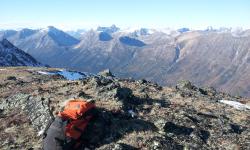
Eagle Plains and Sun Summit Minerals Execute Option Agreement for the Theory Copper-Gold Project, British Columbia

Eagle Plains and Earthwise Minerals Execute Option Agreement for the Iron Range Gold Project, British Columbia
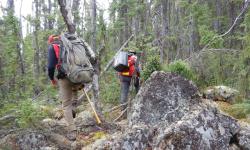
Eagle Plains and Partner Refined Energy Receive Permit for Drilling at Dufferin West Uranium Property, Saskatchewan
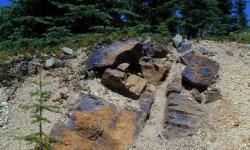
Eagle Plains Announces Letter of Intent with Earthwise Minerals for Option of the Iron Range Project, British Columbia
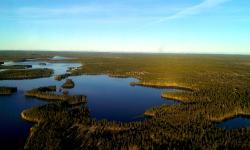
Eagle Plains Partner Xcite Resources Reports Results From Fieldwork at the Uranium City Area Projects, Saskatchewan
